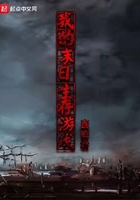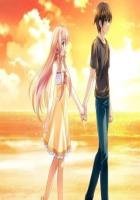I was minded to inquire into his hereditary fitness to design battleships; but inasmuch as I already knew that his father had been a minister in a back-woods village far from the coast, I hesitated lest I offend the dear old fellow.
He was immensely serious about his work, and I must admit that in so far as appearances went he did extremely well with the meager tools and assistance at his command. We had only two short axes and our huntingknives; yet with these we hewed trees, split them into planks, surfaced and fitted them.
The "navy" was some forty feet in length by ten feet beam. Her sides were quite straight and fully ten feet high--"for the purpose," explained Perry, "of adding dignity to her appearance and rendering it less easy for an enemy to board her."
As a matter of fact, I knew that he had had in mind the safety of her crew under javelin-fire--the lofty sides made an admirable shelter. Inside she reminded me of nothing so much as a floating trench. There was also some slight analogy to a huge coffin.
Her prow sloped sharply backward from the water-line--quite like a line of battleship. Perry had designed her more for moral effect upon an enemy, I think, than for any real harm she might inflict, and so those parts which were to show were the most imposing.
Below the water-line she was practically non-existent.
She should have had considerable draft; but, as the enemy couldn't have seen it, Perry decided to do away with it, and so made her flat-bottomed. It was this that caused my doubts about her.
There was another little idiosyncrasy of design that escaped us both until she was about ready to launch--there was no method of propulsion. Her sides were far too high to permit the use of sweeps, and when Perry suggested that we pole her, I remonstrated on the grounds that it would be a most undignified and awkward manner of sweeping down upon the foe, even if we could find or wield poles that would reach to the bottom of the ocean.
Finally I suggested that we convert her into a sailing vessel. When once the idea took hold Perry was most enthusiastic about it, and nothing would do but a fourmasted, full-rigged ship.
Again I tried to dissuade him, but he was simply crazy over the psychological effect which the appearance of this strange and mighty craft would have upon the natives of Pellucidar. So we rigged her with thin hides for sails and dried gut for rope.
Neither of us knew much about sailing a full-rigged ship; but that didn't worry me a great deal, for I was confident that we should never be called upon to do so, and as the day of launching approached I was positive of it.
We had built her upon a low bank of the river close to where it emptied into the sea, and just above high tide. Her keel we had laid upon several rollers cut from small trees, the ends of the rollers in turn resting upon parallel tracks of long saplings. Her stern was toward the water.
A few hours before we were ready to launch her she made quite an imposing picture, for Perry had insisted upon setting every shred of "canvas." I told him that I didn't know much about it, but I was sure that at launching the hull only should have been completed, everything else being completed after she had floated safely.
At the last minute there was some delay while we sought a name for her. I wanted her christened the Perry in honor both of her designer and that other great naval genius of another world, Captain Oliver Hazard Perry, of the United States Navy. But Perry was too modest; he wouldn't hear of it.
We finally decided to establish a system in the naming of the fleet. Battle-ships of the first-class should bear the names of kingdoms of the federation; armored cruisers the names of kings; cruisers the names of cities, and so on down the line. Therefore, we decided to name the first battle-ship Sari, after the first of the federated kingdoms.
The launching of the Sari proved easier than I contemplated.















